Many bookmakers offer free bets as an incentive to keep you entertained and from leaving the sportsbook. Like online social networks, these platforms need active participants to operate for profit. A good customer is a gambler that keeps on betting. The more you gamble, the more money will end up in the bookmaker's pockets.
Yet, free bets are the only gambling activity where you don't stand to lose money. But what about winning money? What's the best way to take advantage of your free bets?
Today, we'll discuss how to make the most out of your free bets. No, it's not just by picking long shots hoping to score a big win for free!
A little history of my betting background
I used to make a living off betting for three years by predicting how betting odds would move. If odds dropped from 2.00 to 1.90 (those are decimal odds by the way) and I happened to foresaw that, I would go on making money before the event started. That's called sports trading, and it's been 15 years since I last did that. I quit because I could no longer beat the game, but not before I built a large enough bankroll.
Fast forward ten years, and I stumbled upon a website called FiveThirtyEight that calculated probabilities for various events, sports included. I thought, let's find out how accurate their model is.
So I devised a simple betting strategy that looked for bets with positive expectancy (i.e., +EV) based on their calculations. Nothing fancy; it's not really rocket science. It's simple multiplications.
The World Cup was taking place at that time, which proved a great introduction to documenting my strategy on Facebook.
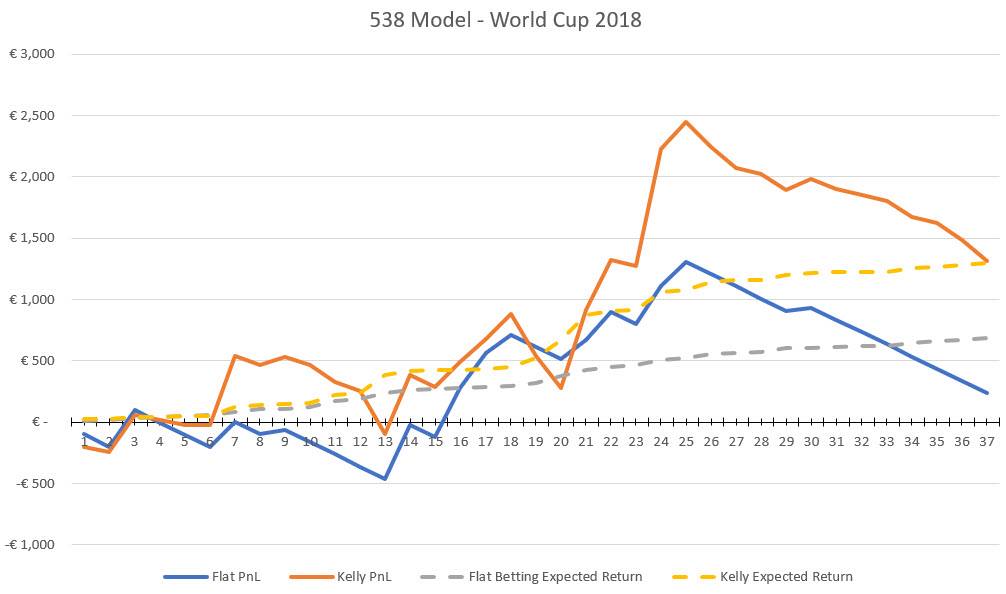
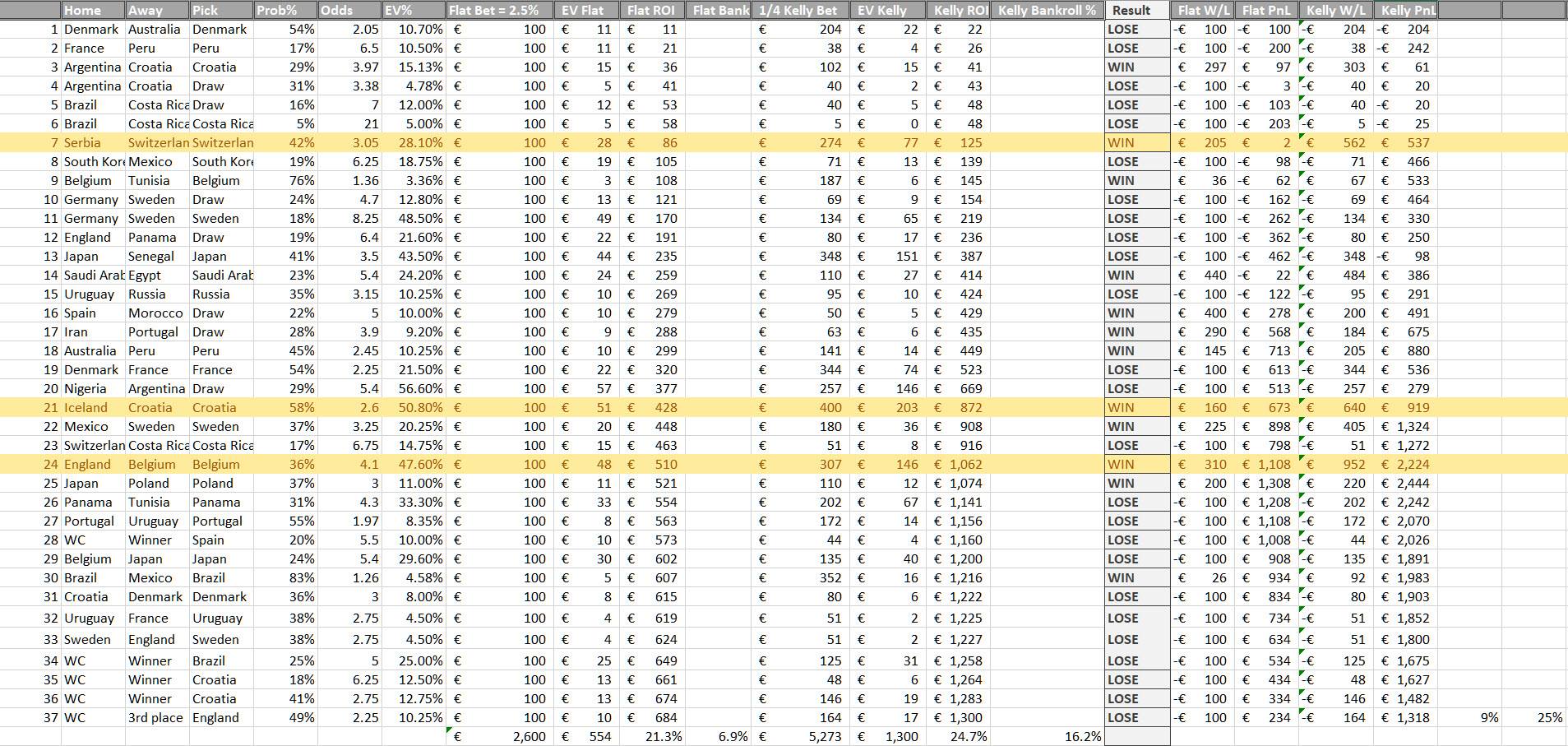
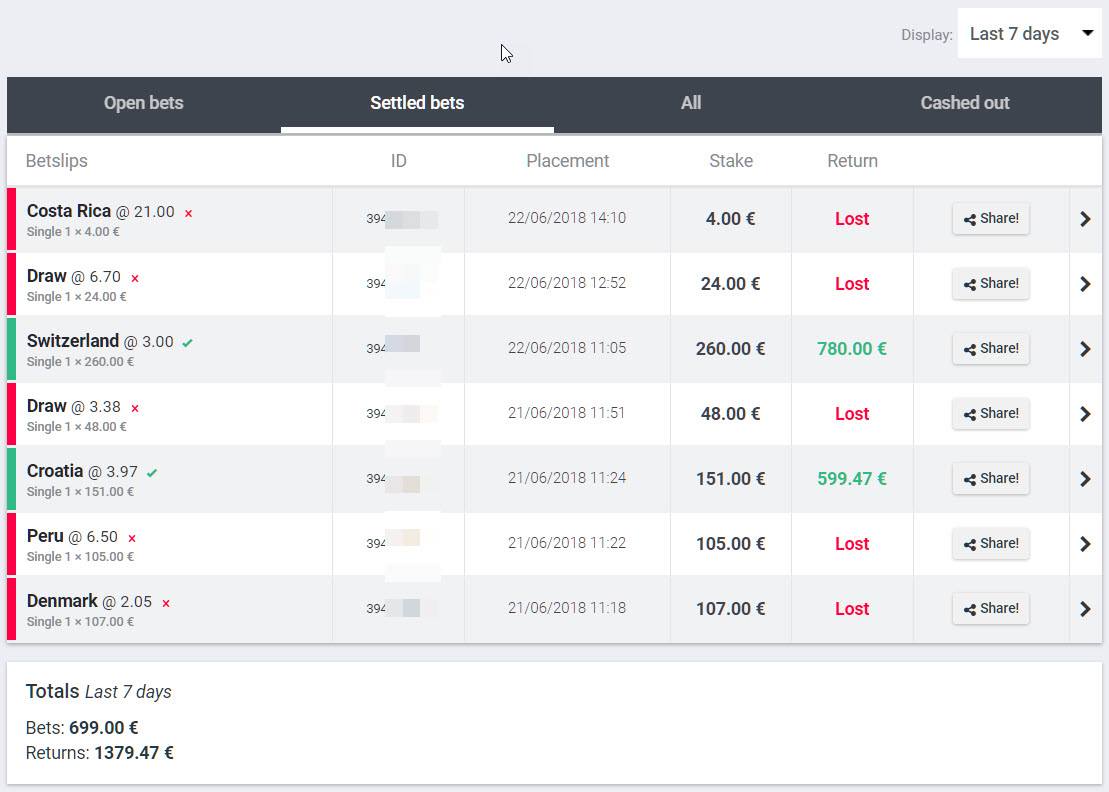
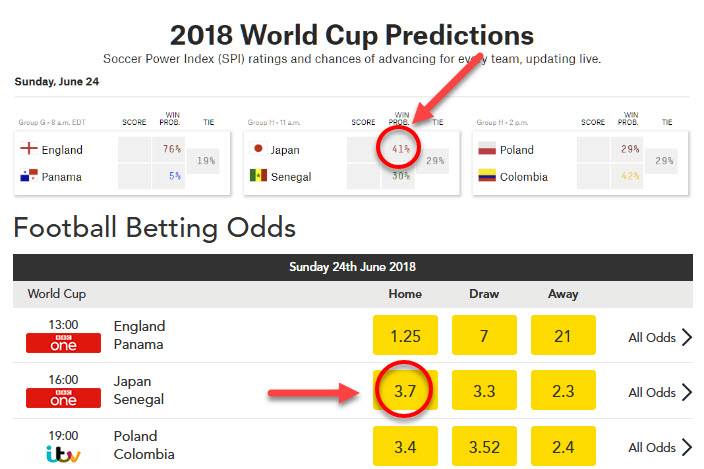
Given the strategy's brief success, I decided to continue and began betting on football leagues worldwide. Unfortunately, the results were below par, and I quit following the strategy shortly after. Besides, I no longer considered myself an advantage player, having moved to web publishing to make a living. Yet, I shared some of my findings before throwing the towel to anyone wanting to test the waters.
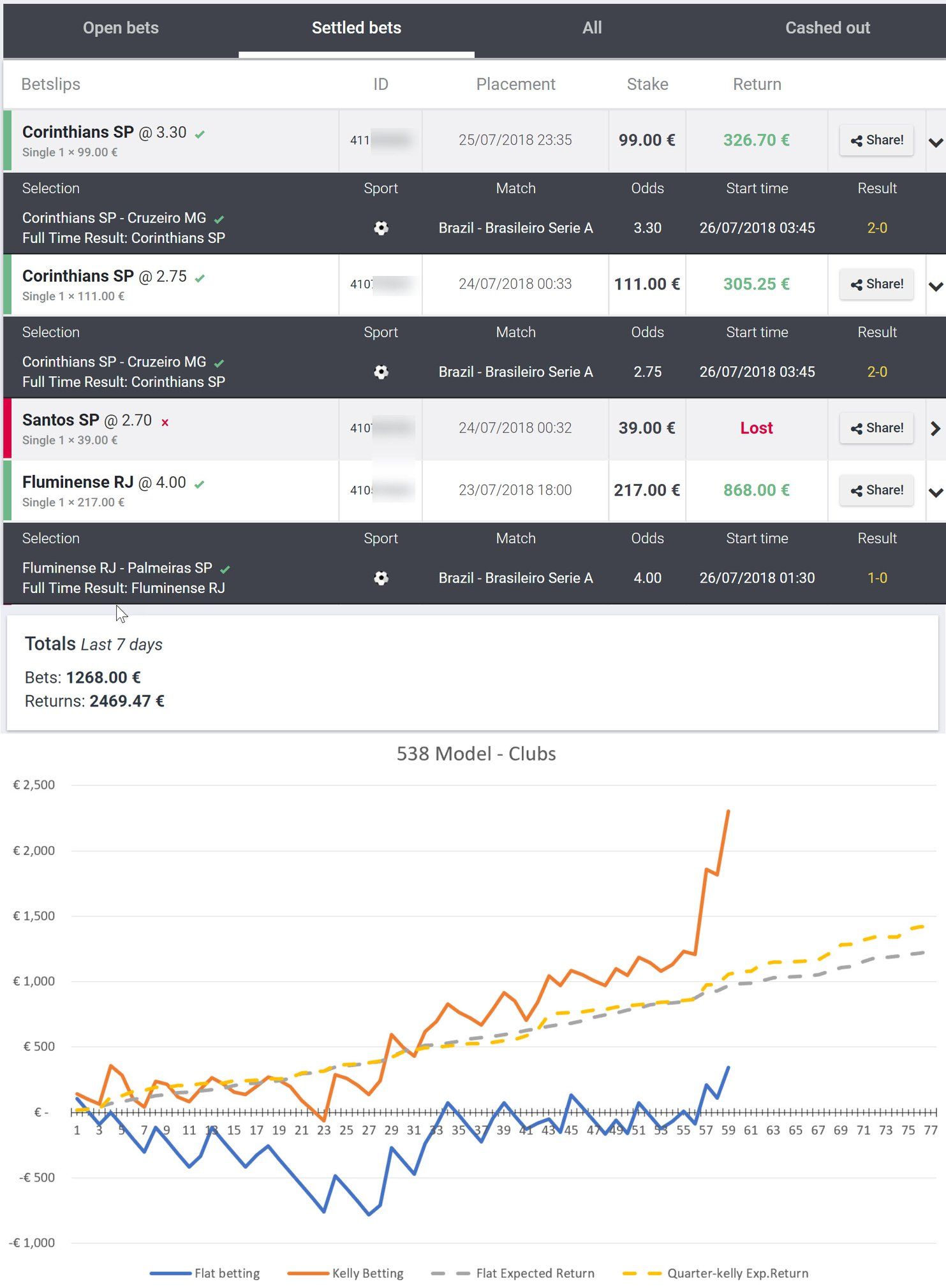
How I ended up with free bets in my account
Since then, I have rarely placed bets. Gambling for a living and taking enormous risks no longer fit my age. But if I read something, I may make a fun bet. That's how I ended up betting on the Formula 1 Austrian GP last weekend, which also led me to bet on the Wimbledon final match.
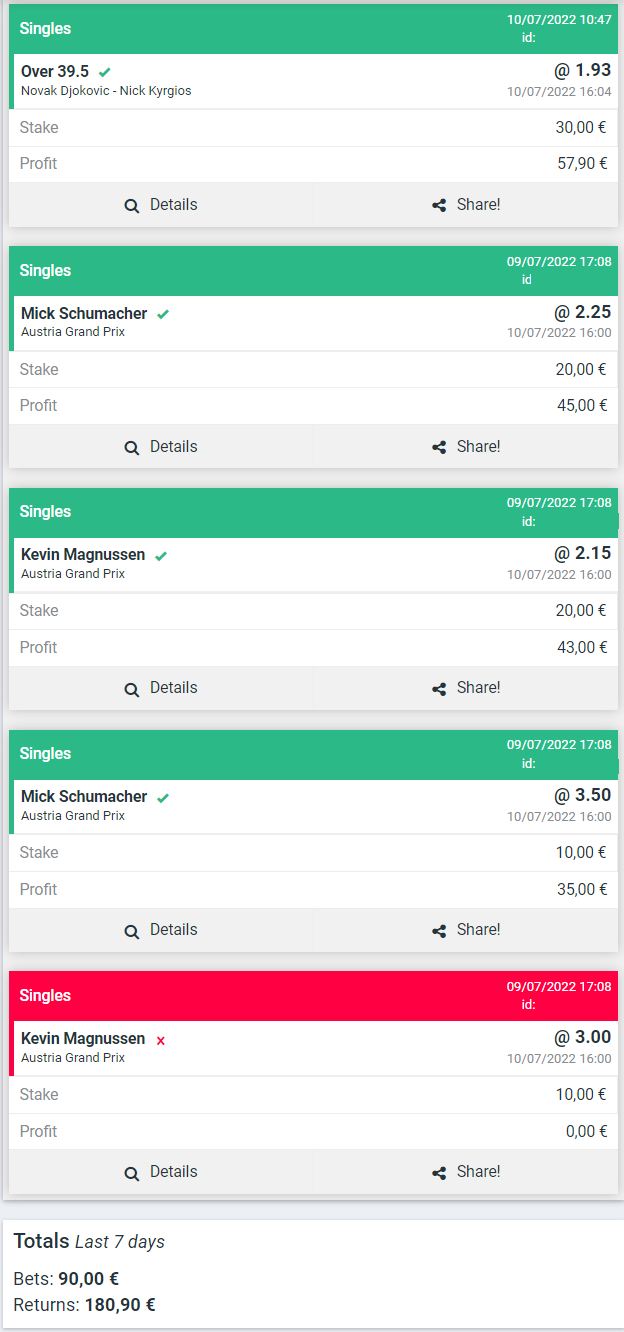
I rarely miss a Formula 1 race, and when I do, I watch the qualifying and race highlights on YouTube. That's where I read a specific comment last Saturday that fancied the Haas drivers ending in the top 6 in Sunday's race after the Sprint race was complete. F1 fans have certainly noticed Magnussen's and Schumacher's improving performance in recent races. Coupled with the punters' typical behavior of cheering for the underdogs, I decided to gamble a bit.
My local bookmaker offered a free bet if I wagered €20 on the F1 event. While placing the bets, I noticed it offered another free bet, this time on the Wimbledon final. That's how I ended up betting on Djokovic and Kyrgios battling out in more than 39.5 games, as I was predicting a close fight.
And this is how, at the time of writing these lines, I have two €10 free bets.
Why you should risk your free bets on longshots
Given my background as an advantage player, I spent a few minutes thinking of how to maximize my EV on a free bet. I'm not used to having free bets, as I never depended on those to become profitable in gambling. But since I had them, I wanted to play properly. And by properly, I mean mathematically correct.
Surfing around the internet, a couple of websites recommend always using the free bets on long odds since you only get paid the winnings. There's no return of your free bet, meaning if you bet €10 on 2.00 odds, your account increases by 10, not by 20.
While betting on longshots increases your variance (obviously, you're going to win a lot more often if you bet on 1.50 odds compared to 15.0!), it still made sense to avoid short odds since you don't stand to lose money. But I wanted to dig a bit deeper and make my calculations.
Let's start.
Say there's an event that pays 1.25, and somehow we know that its true probability of happening is 80%. While it's not a bet with a positive or negative expectancy (given 1.25 multiplied by 0.80 equals 1, thus no value) in normal betting, it's +EV because we don't lose money. That's because:
80% * 0.25 - 20% * 0 = 0.2
So, ANY event we place a free bet on, it's a +EV bet; thus, a winning bet in the long run. Even if you bet on very short odds, it's a correct play. In my example, 80% of the time we win 0.25*stake, and 20% we lose nothing.
Let's see what happens with preferring long odds when placing free bets.
Say another event pays 10.0 times your free bet, and somehow miraculously, we know its actual probability is 10%, making it a fair play again (0.10 * 10 = 1). But here's the calculation due to the free bet condition:
10% * 9 - 90% * 0 = 0.9
The result is that not only does betting on long odds have a positive expectancy, but it's also more profitable than betting on short odds, confirming the prevailing notion.
Now that I confirmed I need to find long odds, I need to answer another question: do I blindly bet on anything more than 10.0, or is there a better way?
Maximizing the potential of free bets
Did you notice the main assumption in the previous section? I assumed we knew the actual probability of an event taking place. So, we need a way to find those probabilities in the first place.
Note that this is the bread and butter of every betting strategy.
Since I already knew where to find some probabilistic calculations on sports events, I thought of maximizing my profit by betting on theoretically +EV long odds. Remember, these probabilities haven't been proven to accurately calculate the actual probability of the events. For what it's worth, my old strategy proved the exact opposite. Yet, perhaps their margin of error is not that significant, making bets with large positive expectancy more promising.
The first pick that stood out in my 20-minute analysis was Sundsvall. With odds at 7.00 and theoretical probability at 25%, it's a strong +EV bet even without the free bet. But given the free bet scenario, I calculate:
25% * 6 - 75% * 0 = 1.5

In theory, betting on Sundsvall at 7.0 is much more profitable than randomly betting on a 10.0 chance! My €10 free bet will theoretically net me €15 in the long run.
Then I found two more picks that returned a positive expected value.

Although I'm a firm believer in betting on singles, I opted for a parlay with these two to take advantage of the value found on both picks (theoretically, as always). If we assume there's value in both selections, adding them in a parlay multiplies our edge, much like a bookmaker's edge is multiplied when we add -EV bets in a parlay. In fact, that's the very reason I'm against a parlay for all recreational gamblers.
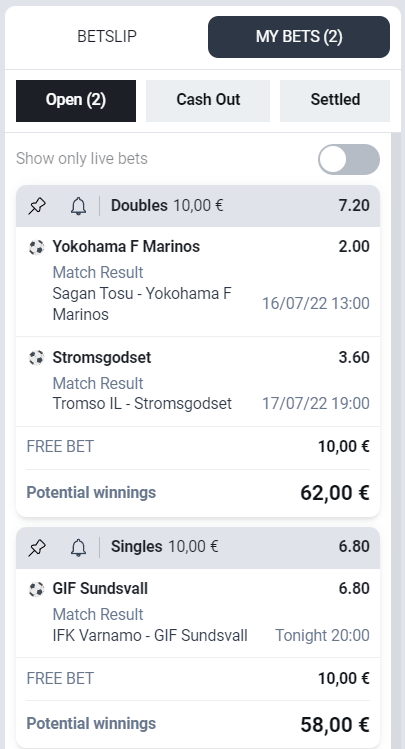
In conclusion:
- Always bet what you can afford to lose; stay responsible with your finances
- Pick long odds when placing free bets
- Estimate a probability for any event before looking to betting odds to find bets with positive expectancy
- Make your free bet picks based on EV, rather than blindly betting on random long shots
- And never cash out!






